| Author |
Message |
Kirk Lee Spencer

|
 Posted: Sun 29 Dec, 2013 10:05 pm Post subject: Sinclair-Hilted Falchion by Vladimir Cervenka Posted: Sun 29 Dec, 2013 10:05 pm Post subject: Sinclair-Hilted Falchion by Vladimir Cervenka |
 |
|
Hi all...
I've been away for a while with work and life. However, I wanted to start a thread about a wonderful sword Vladimir Cervenka made for me many years ago. I wrote a review for the sword but never got around to publishing it. So I would like to do that now as part of this thread.
Sinclair Hilts
The late 16th century was a time when basket-hilted swords were taking shape and moving slowly toward more obvious national identities. It is during this time that a particular form emerged that sits near the center of all the new innovations in hilt design. It is called the “Sinclair” hilt. The Sinclair sword gets its name through a rather dubious set of associations. In the 19th century a number of complex hilted antique swords of German manufacture made their way into the Norwegian antiquities market. These swords had recurved quillons, pyramid shaped pommel and a large guard plate of roughly triangular shape, often pierced with diamonds, hearts or circles. Collectors were quick to notice a superficial resemblance to Scottish basket-hilted swords. In the Romantic ferment of the Victorian Age, the association of “Scottish” swords and Norway would bring to mind Lord George Sinclair and his ill-fated band of Scotsmen. In an attempted to make their way across Norway to Sweden in 1612, this company of Scotsmen were ambushed and massacred is the Valley of Kringen. Colonel George Sinclair led the company through the valley making himself and easy target. He was one of the first to fall and his name would become a symbol of the vanquished enemy to the Norwegians. So it was this name, “Sinclair,” that was attached to the Scottish looking swords appearing in the 19th century antiquities market. Yet the swords that bears the Sinclair name probably never appeared in the hands of Sinclair’s Scotsmen. English hilts and Ribbon hilts would probably be more likely candidates.
ks
 Attachment: 76.23 KB Attachment: 76.23 KB

Archtypical Sinclair Falchion
Two swords
Lit in Eden’s flame
One of iron and one of ink
To place within a bloody hand
One of God or one of man
Our souls to one of
Two eternities
|
|
  |
 |
Kirk Lee Spencer

|
 Posted: Sun 29 Dec, 2013 10:09 pm Post subject: Posted: Sun 29 Dec, 2013 10:09 pm Post subject: |
 |
|
Although Sinclair swords are not Scottish, they are of interesting design and were somewhat popular on the continent throughout much of the 17th century. The pyramid shaped pommel, and to a lesser degree, the recurved quillons, suggests the Sinclair hilt developed from seminal early German basket forms. The triangular “sail” guard could have appeared as an elongation of the shell guards popular at the time. While shorter cutlass and falchion blades seem to be more common, Sinclair hilts can be found with many different blade lengths and forms.
ks
 Attachment: 68.44 KB Attachment: 68.44 KB
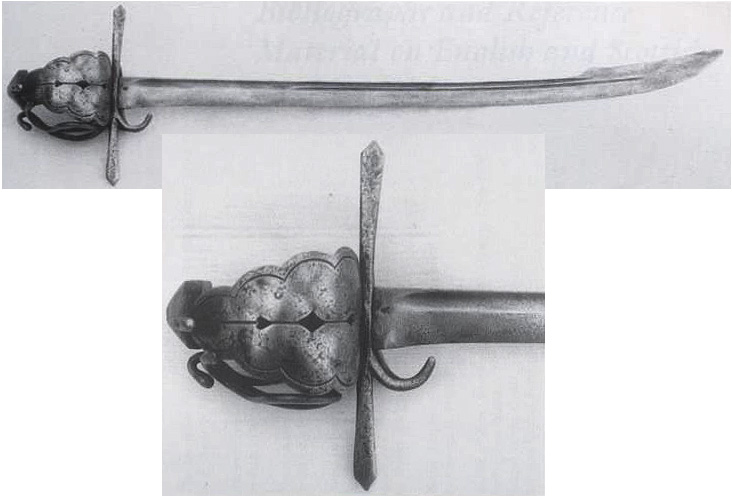
And Another Sinclair Falchion
 Attachment: 63.03 KB Attachment: 63.03 KB
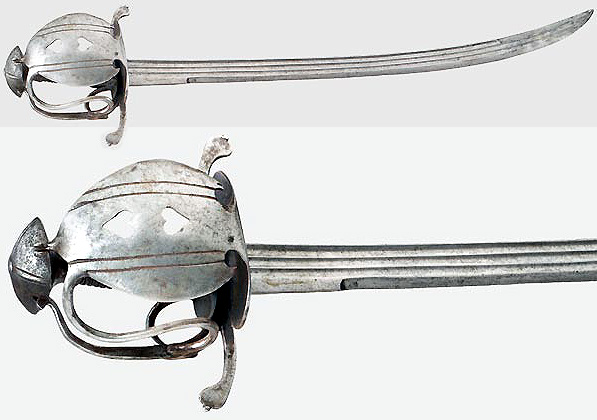
Another Sinclair Sword
Two swords
Lit in Eden’s flame
One of iron and one of ink
To place within a bloody hand
One of God or one of man
Our souls to one of
Two eternities
|
|
  |
 |
Kirk Lee Spencer

|
 Posted: Sun 29 Dec, 2013 10:16 pm Post subject: Posted: Sun 29 Dec, 2013 10:16 pm Post subject: |
 |
|
Cervenka Sinclair Hilted Falchion
Vladimir Cervenka has been making edged weapons for over three decades. His works have been displayed in several European arms exhibitions. He has made swords for collectors throughout Europe and America in a wide variety of sword types. He also recreates other edged weapons as well as armour. Cervenka’s Sinclair falchion is not a recreation of a specific historical piece. Cervenka’s recreation has a pyramidal pommel, unscalloped edges to the guard, with diamonds and heart piercings grouped in the middle of the guard.
While multiple fullers are common on Sinclair blades, they seem to be too much of a focal point. So I had the multiple fullers combined into one large shallow fuller.
ks
 Attachment: 56.51 KB Attachment: 56.51 KB
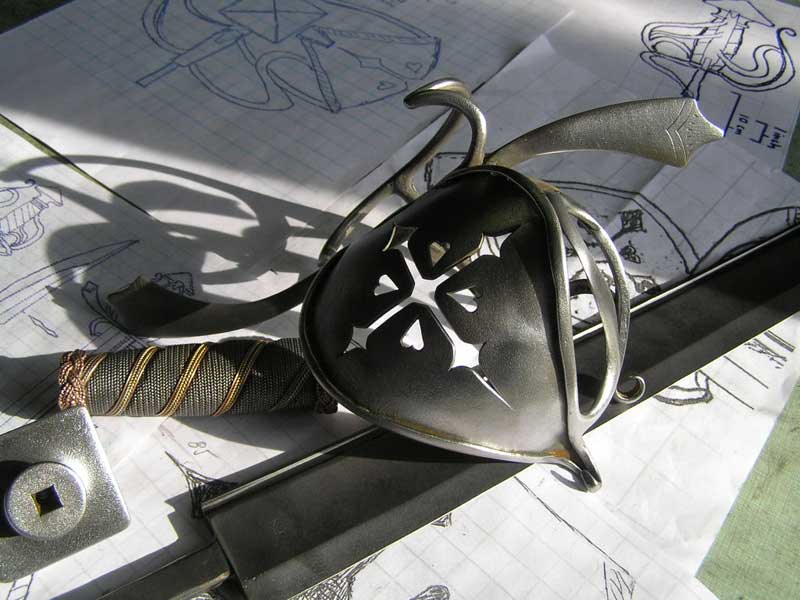
Another in progress picture of components
 Attachment: 96.97 KB Attachment: 96.97 KB
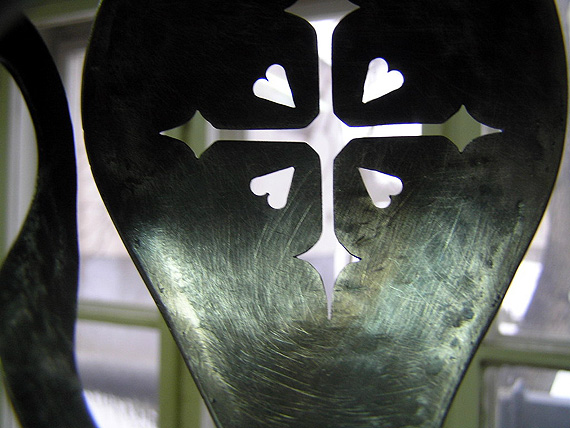
In progress close-up of beautiful piercings on the sail guard. Hammer marks still visible on inside of guard as per many orginals.
 Attachment: 47.3 KB Attachment: 47.3 KB
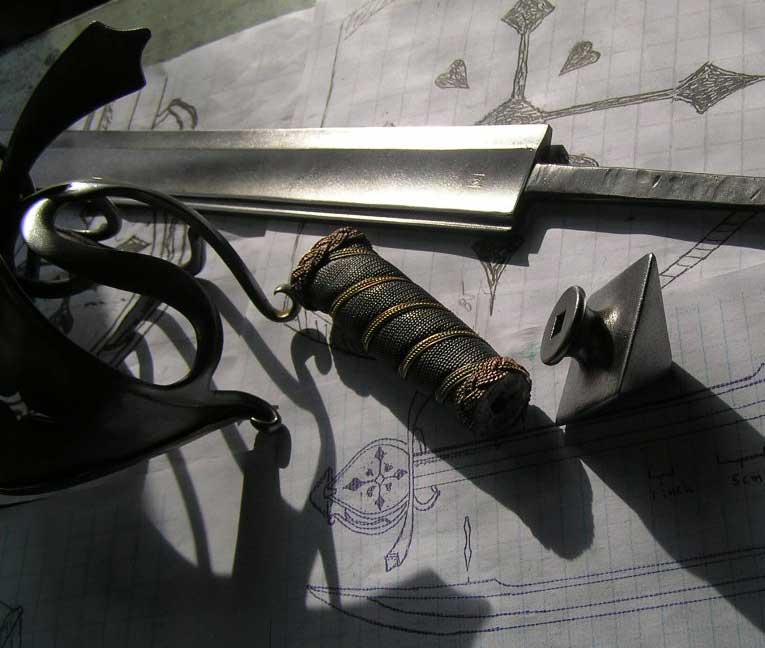
Close-up of the component parts
Two swords
Lit in Eden’s flame
One of iron and one of ink
To place within a bloody hand
One of God or one of man
Our souls to one of
Two eternities
|
|
  |
 |
Kirk Lee Spencer

|
 Posted: Sun 29 Dec, 2013 10:26 pm Post subject: Posted: Sun 29 Dec, 2013 10:26 pm Post subject: |
 |
|
Measurements and specifications:
Weight: 2 pounds, 3 ounces (998 grams)
Overall length: 32 inches (81.3 cm)
Blade length: 26.5 inches (67.3 cm)
Blade width: 1.7 inches (4.5 cm) at base
Grip length: 3.75 inches (9.5 cm)
Guard width: 9 inches (22.9 cm)
Basket width: 4.5 inches (11.4 cm)
Point of Balance: 2.5 (6.4 cm) inches from guard
Center of Percussion: 16 (40.6 cm) inches from guard
ks
 Attachment: 70.96 KB Attachment: 70.96 KB
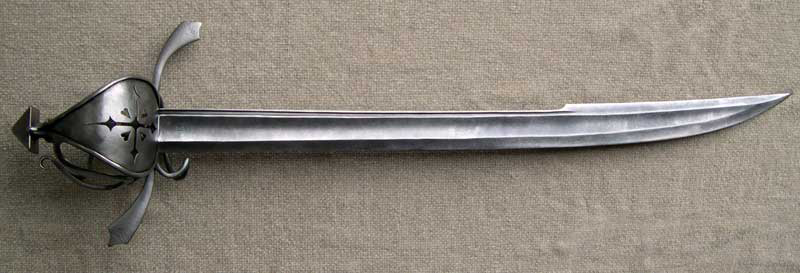
Cervenka Sinclair-Hilted Falchion
Two swords
Lit in Eden’s flame
One of iron and one of ink
To place within a bloody hand
One of God or one of man
Our souls to one of
Two eternities
|
|
  |
 |
Kirk Lee Spencer

|
 Posted: Sun 29 Dec, 2013 10:32 pm Post subject: Posted: Sun 29 Dec, 2013 10:32 pm Post subject: |
 |
|
Handling Characteristics
As might be expected the wire grip abrades the hand during cutting exercises. This is especially true along the ferrules. However, this would probably not be the case in a soldier’s calloused hand. It certainly gives an excellent purchase on the sword. The wires sink into the hand and seem to weld it to the grip. The few production Sinclair swords have baskets that appear oversized. However, the basket on Cervenka’s Sinclair falchion is just the right size for my hand. The snug fit of the basket, along with the tight purchase on the grip makes it fit like a glove, or rather a gauntlet.
ks
 Attachment: 92.94 KB Attachment: 92.94 KB
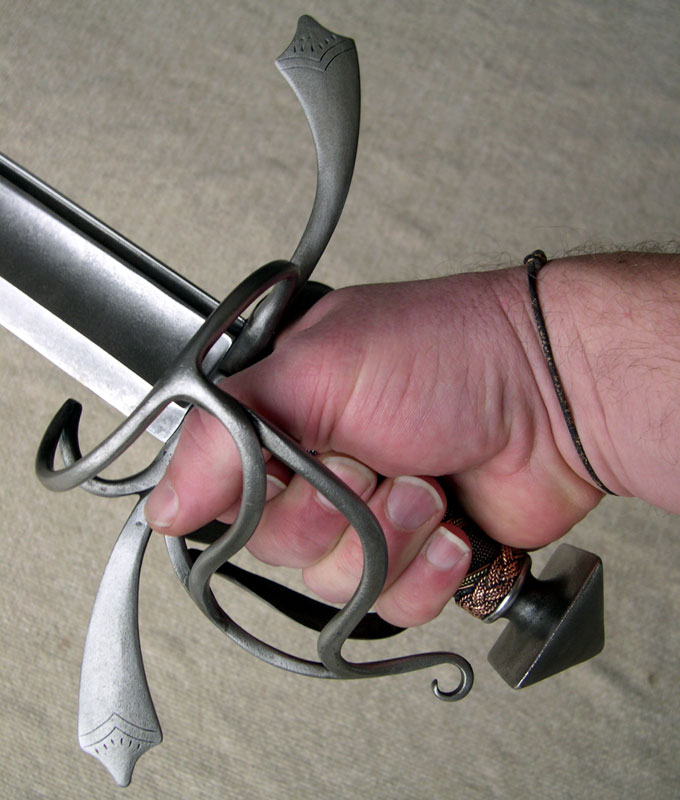
Sword in Hand
 Attachment: 74.17 KB Attachment: 74.17 KB
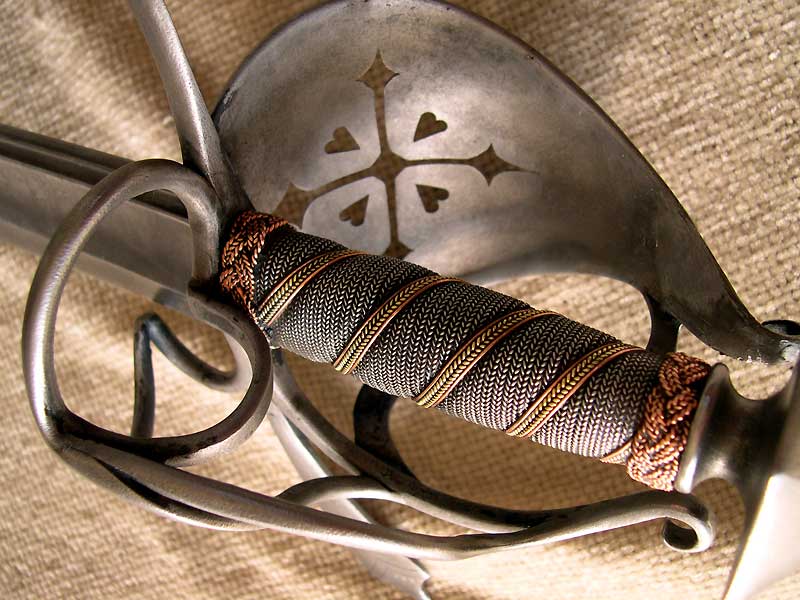
Grip Detail
Two swords
Lit in Eden’s flame
One of iron and one of ink
To place within a bloody hand
One of God or one of man
Our souls to one of
Two eternities
|
|
  |
 |
|
Patrick Kelly
|
 Posted: Sun 29 Dec, 2013 10:36 pm Post subject: Posted: Sun 29 Dec, 2013 10:36 pm Post subject: |
 |
|
Excellent review Kirk, and a fine sword too.
I've always liked swords of this style, They're a bit of an odd duck in many ways and that makes them intruiging. I like your choice of the broad fuller. That, cobined with the blades tip geometery make for a menacng profile.
"In valor there is hope.".................. Tacitus
|
|
   |
 |
Kirk Lee Spencer

|
 Posted: Sun 29 Dec, 2013 10:37 pm Post subject: Posted: Sun 29 Dec, 2013 10:37 pm Post subject: |
 |
|
At first I thought that the thumb-ring was positioned too far back. However after the cutting exercises it seems about right. I knew that the thumb-ring would help maintain blade alignment during the cut; and that was the case. What I did not count on was how the thumb-ring kept my hand from slipping down the grip onto the pommel. The forward guard never made much sense to me until I got the sword in my hand. It is clear that it would do a good job of redirecting your opponent’s blade around and away from your thumb as it slid down your blade.
ks
 Attachment: 75.15 KB Attachment: 75.15 KB
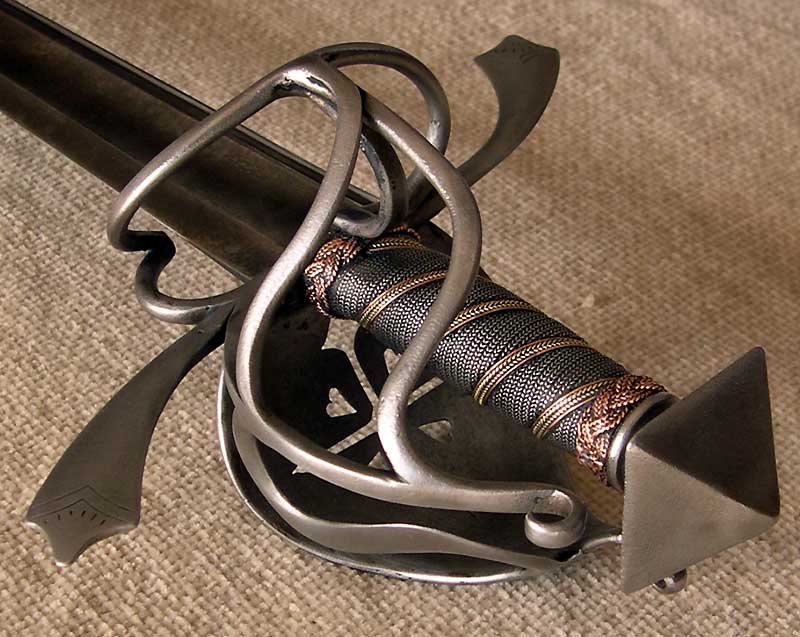
In-board side showing forward guard from back
 Attachment: 97.77 KB Attachment: 97.77 KB
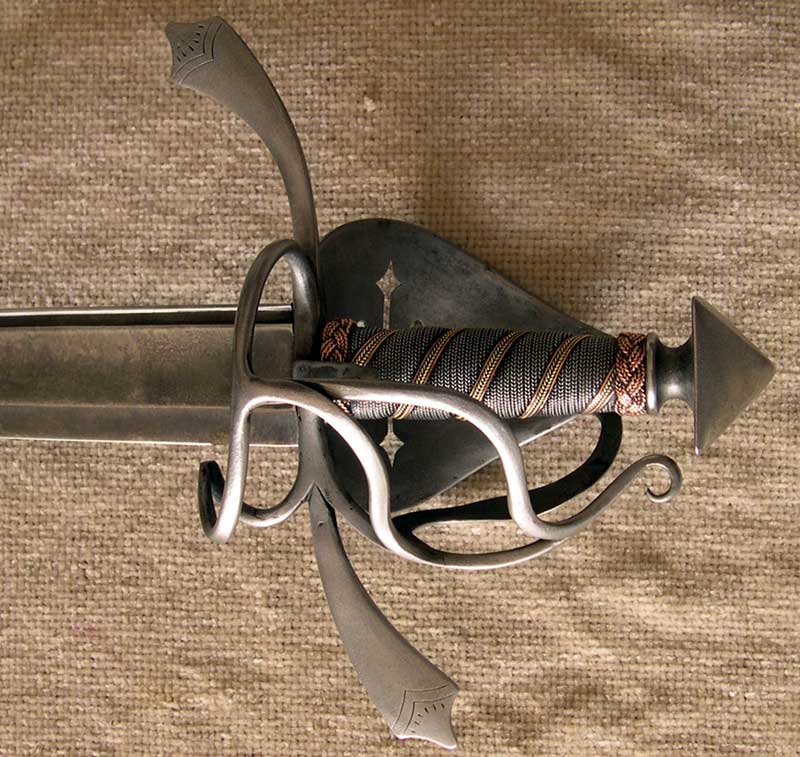
In-board side
 Attachment: 71.42 KB Attachment: 71.42 KB
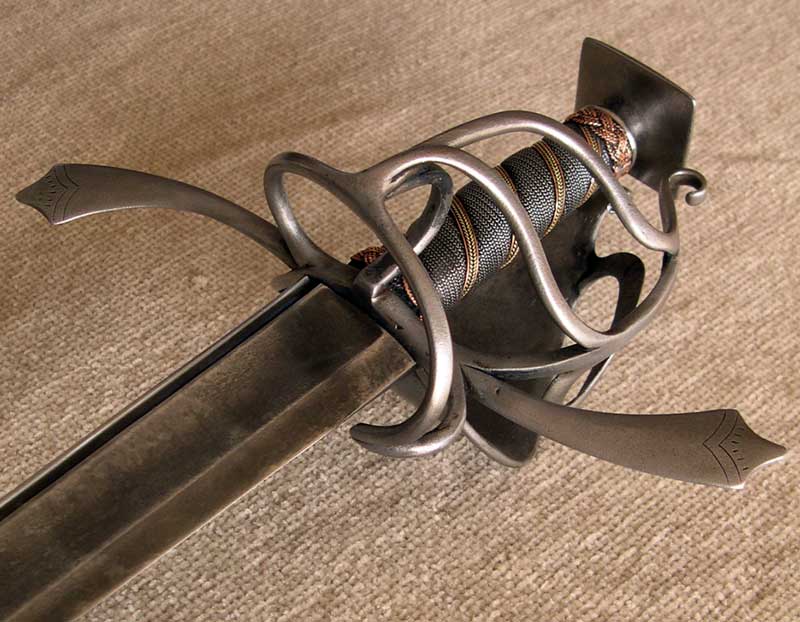
In-bard side showing forward guard from front
Two swords
Lit in Eden’s flame
One of iron and one of ink
To place within a bloody hand
One of God or one of man
Our souls to one of
Two eternities
|
|
  |
 |
Kirk Lee Spencer

|
 Posted: Sun 29 Dec, 2013 10:40 pm Post subject: Posted: Sun 29 Dec, 2013 10:40 pm Post subject: |
 |
|
The blade has a good deal of distal taper. This pulls the center of gravity back closer to the hand giving the sword a certain amount of finesse. This is unexpected for a blade shape that looks, at least in profile, as if it were made for chopping. However, this distal taper, along with a superb tempering job, gives the blade an amazing amount of flexibility.
ks
 Attachment: 171.94 KB Attachment: 171.94 KB

Blade Flexability
 Attachment: 202.79 KB Attachment: 202.79 KB
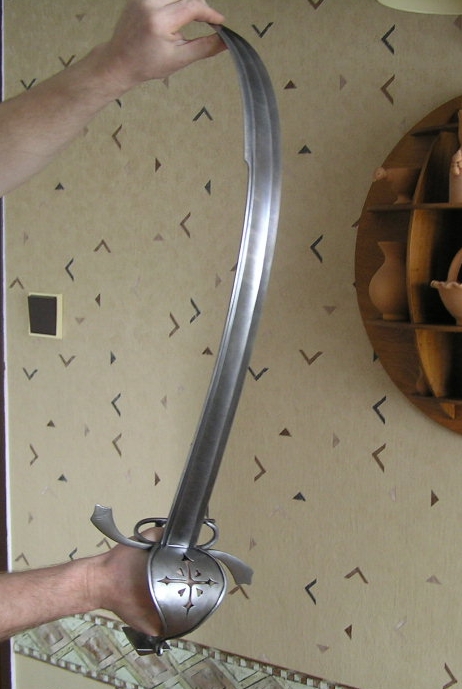
Blade Flexability
Two swords
Lit in Eden’s flame
One of iron and one of ink
To place within a bloody hand
One of God or one of man
Our souls to one of
Two eternities
|
|
  |
 |
Kirk Lee Spencer

|
 Posted: Sun 29 Dec, 2013 10:47 pm Post subject: Posted: Sun 29 Dec, 2013 10:47 pm Post subject: |
 |
|
As might be supposed from the stats, this sword is light and quick. With this in mind, while cutting it is easy to appreciate the identifying element of the Falchion blade design, namely the widening of the blade near the center-of-percussion. The increased mass, due to the slightly wider blade in this area, provides increased impetus just where it is needed for an affective cut. At the same time, the thickened diamond cross-section near the tip gives a welcome rigidity to the tip for better penetration during thrusting. It is a design as elegant to the engineer as to the artist.
The sword has a nice static balance. However, while swinging the sword I felt myself wanting a little more blade presence. It must be kept in mind that this may be simply due to the fact that I am familiar with swords that have five or six more inches of blade. This became obvious in the first cut—a tip cut. After I forced myself to move close to the target, to get better placement of the cut, the sword really began to shine. Moving closer to the target really impressed upon me how much closer six inches really is. It would allow the sail guard to come into play as an offensive weapon—a nice set of brass knuckles (or steel knuckles in this case). Also, if jammed by an opponent in the back swing, the point of the pyramid could make quite an “impression” upon their face. And with the blade turned back toward your neck, you begin to appreciate why these shorter falchions and cutlasses were commonly backswords. No sharpened back-edge near the jugular.
I tested the blade against harder targets. I wanted to see what kind of penetration I could get swinging from the wrist through a 90 degree angle into a ¾ inch sapling. To my amazement it cut clean though the sapling and a quarter inch into a nearby sapling. And this was with just the momentum generated in a wrist cut at 90 degrees. After cutting effortlessly though five or six such saplings the blade edge showed no damage.
Fit and Finish
When viewing Cervenka’s Sinclair Falchion, the first thing that comes to mind is its smallness. However, when you measure it, it’s not small. It is a feeling I have had when handling the very few original swords I have had the privilege to hold. There is a sense of economy. Yet when in hand, you can tell these swords were meant for business and not as collector’s items or props.
The hilt components are tight and secure with no large gaps between the elements. The sword has a solid reliable feel. The fullers are even and straight with beautiful lines. There are no grind marks visible on the blade. When grinding the blade, Cervenka stopped the fuller right at the cross guard. I like this feature because it keeps water from running up the fuller and into the hilt. It also allows the tang to retain its full thickness.
ks
 Attachment: 69.25 KB Attachment: 69.25 KB
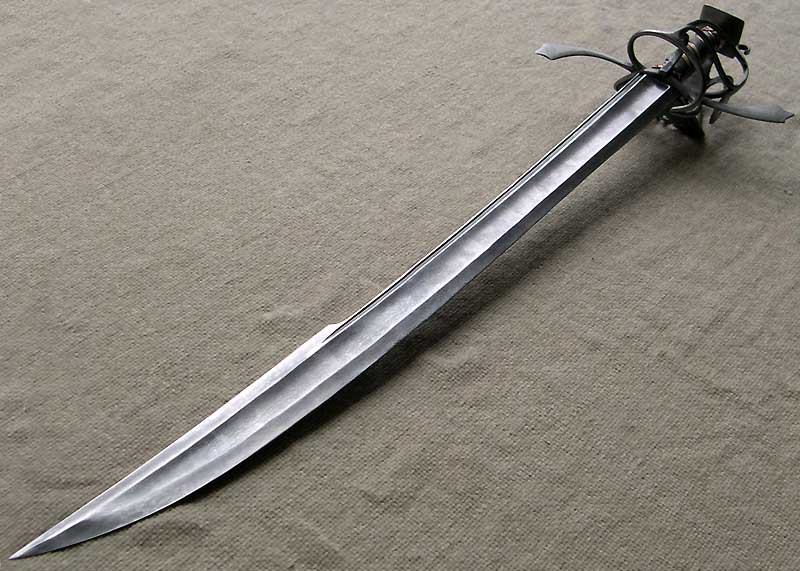
Beautiful falchion blade and fuller
 Attachment: 63.63 KB Attachment: 63.63 KB
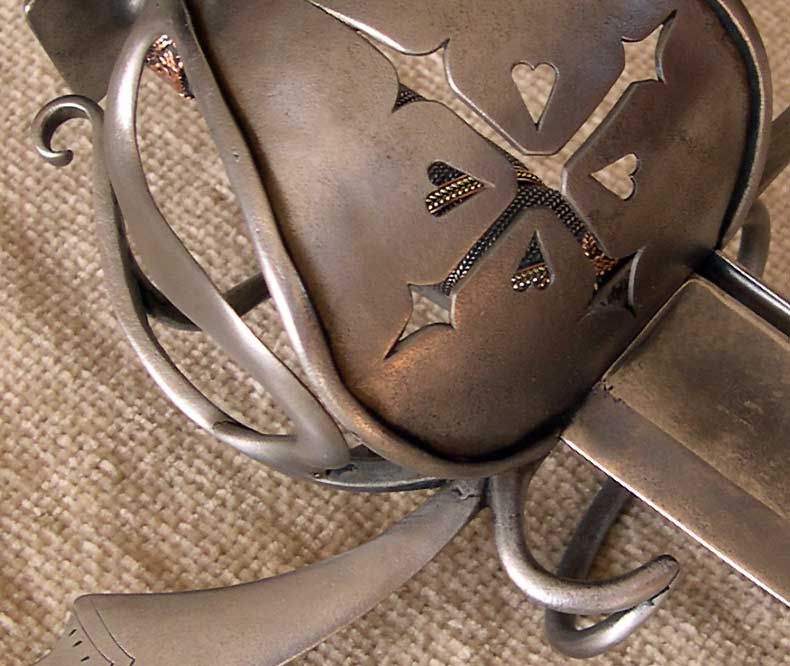
Close-up of fuller at guard which shows Cervenka's way of ending the fuller just at the guard to keep water from entering the hilt through the fuller.
Two swords
Lit in Eden’s flame
One of iron and one of ink
To place within a bloody hand
One of God or one of man
Our souls to one of
Two eternities
|
|
  |
 |
Kirk Lee Spencer

|
 Posted: Sun 29 Dec, 2013 10:51 pm Post subject: Posted: Sun 29 Dec, 2013 10:51 pm Post subject: |
 |
|
The pommel is a perfect pyramid as seen on many, if not most, original Sinclair swords. The tang is peened over the end of the pommel and filed and polished to shape. The sword grip is a work of art in itself. It is bound in twisted steel wire in an alternating herringbone pattern wrapped around a spiraled wooden core. In the spiral grooves two twisted wires of brass are wrapped in a herringbone pattern and are flanked by two untwisted copper wires. The ends of the grip are finished with ferrules of twisted copper wire braded into what appears to be a Turk’s head knot. The thumb-ring is nicely done and is subtly shaped to fit the thumb.
ks
 Attachment: 74.89 KB Attachment: 74.89 KB
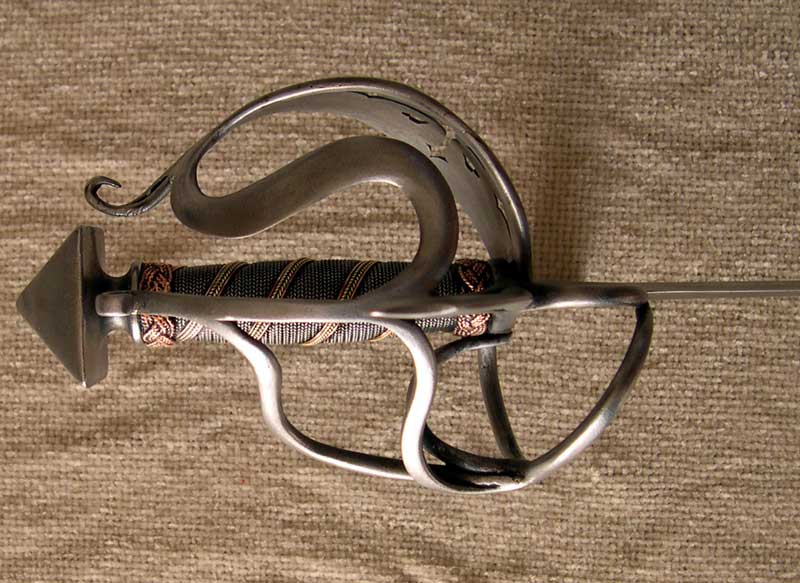
Hilt viewed from bottom
 Attachment: 70.21 KB Attachment: 70.21 KB
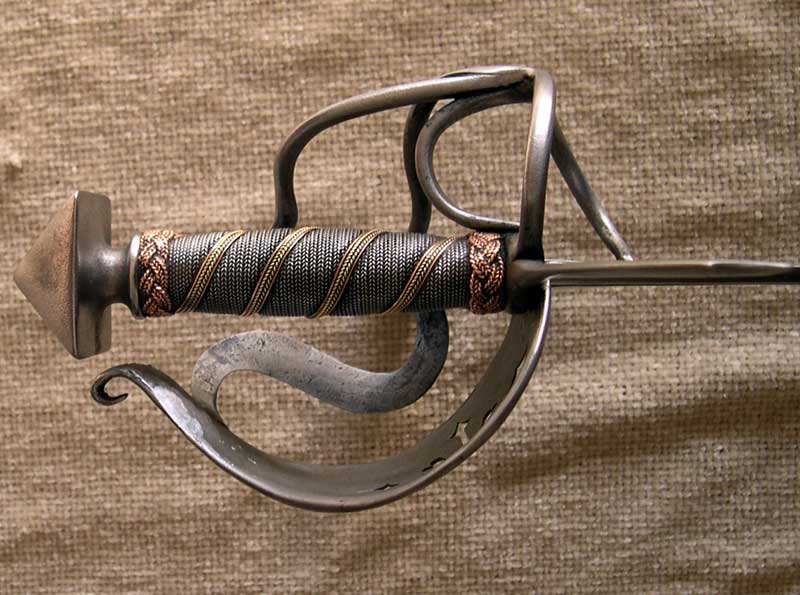
Hilt viewed from top
Two swords
Lit in Eden’s flame
One of iron and one of ink
To place within a bloody hand
One of God or one of man
Our souls to one of
Two eternities
|
|
  |
 |
Kirk Lee Spencer

|
 Posted: Sun 29 Dec, 2013 10:55 pm Post subject: Posted: Sun 29 Dec, 2013 10:55 pm Post subject: |
 |
|
The aged finish is even, for the most part, and very appealing. The blade has been darkened and the tops of the etched portions are polished. This gives the surface treatment a dimensional look that changes its shading when in motion. It’s as if the tops of the etched parts are small mirrors with reflected light passing over them as the blade moves. It’s a fascinating affect. The darkened polished blade contrast well with the hilt which is not polished and has a slight difference in the character of the etching. The aging of the sword has a natural well-used vintage look rather than just a patina due to neglect.
ks
 Attachment: 54.98 KB Attachment: 54.98 KB
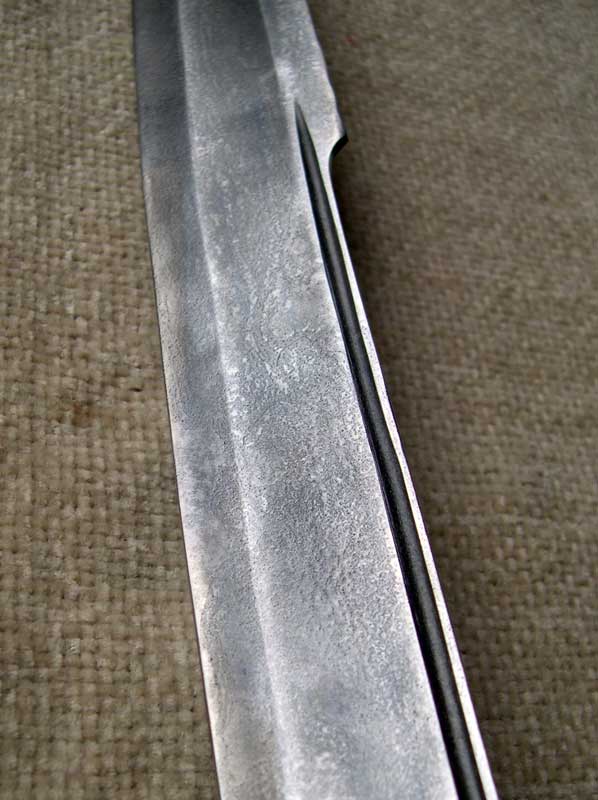
Close-up of the blade showing patina-like artificial aging.
 Attachment: 59.22 KB Attachment: 59.22 KB
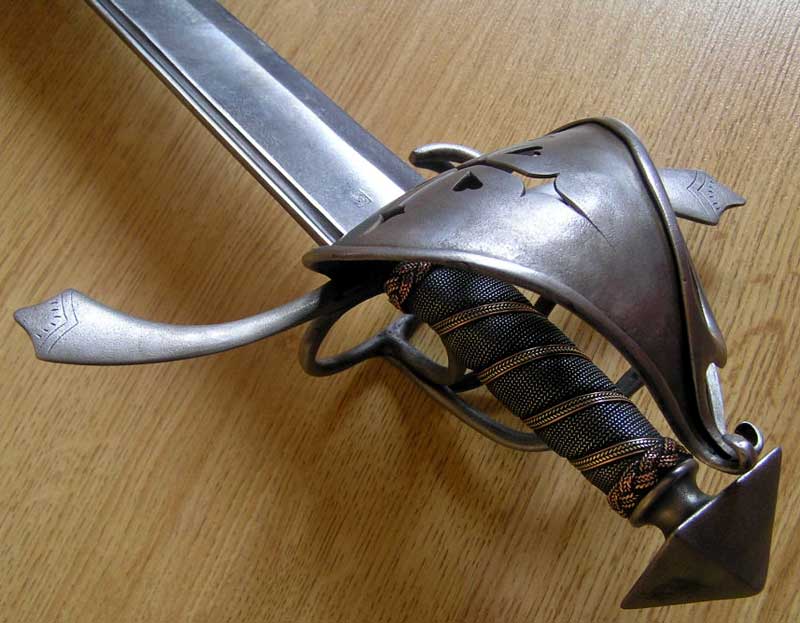
Slight aging of the hilt components
Two swords
Lit in Eden’s flame
One of iron and one of ink
To place within a bloody hand
One of God or one of man
Our souls to one of
Two eternities
|
|
  |
 |
Kirk Lee Spencer

|
 Posted: Sun 29 Dec, 2013 10:59 pm Post subject: Posted: Sun 29 Dec, 2013 10:59 pm Post subject: |
 |
|
I have owned several Cervenka swords. They all possessed a few slight irregularities, which in my opinion do not distract, but rather add to, the organic and natural feeling of his swords. I is a difficult thing to describe. I recently read a post by Peter Johnsson addressing the same idea as it relates to the subtle aesthetic quality of original medieval swords. As usual, he expressed it perfectly. So I can do no better than to just quote Peter:
“If a craftsman with many years experience works as quickly as he can, the result is going to express a certain type of quality or character… They were not like contemporary custom makers who made single pieces for collectors who mind finish and style very much and wants a showpiece that express high precision in every detail… A medieval sword very often shows irregularities and less than perfectly executed details. Fullers might wander slightly, edges might snake, guards are less then symmetrical. Still they do not look like they are made in a sloppy way. You can see that the person who made this object was very experienced and there is something profoundly effortless and elegant in the overall expression. It is like calligraphy. To be a decent calligrapher you need to study letterforms for many years. You need to know them so well that their shaping becomes as natural as breathing. Still, what you write is not beautiful calligraphy until you can do it at a certain speed. This is called "ductus": the ability to work skillfully and quickly with graceful results. Then the writing will express energy, power, personality and something of the moment of creation…”
Conclusion
Vladimir Cervenka is a fine and friendly gentleman. You can sense that he is an artist as wall as a craftsman. His Sinclair falchion is the third Cervenka sword I have had the privilege to handle and review. It clearly shows a continued improvement in what was already a very fine product. I look forward to seeing and owning more of his work.
ks
 Attachment: 78.69 KB Attachment: 78.69 KB
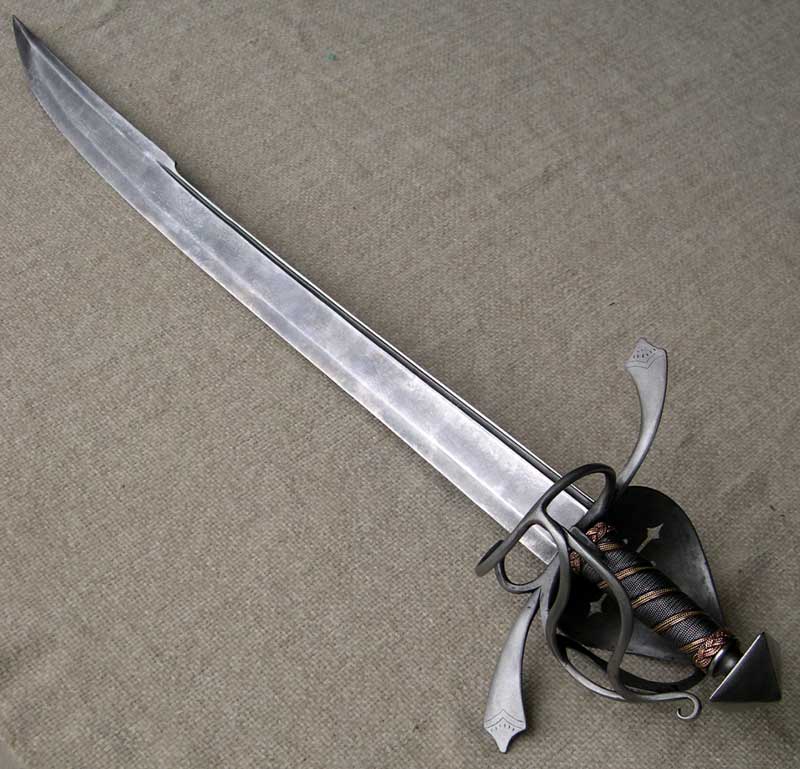
 Attachment: 85.98 KB Attachment: 85.98 KB
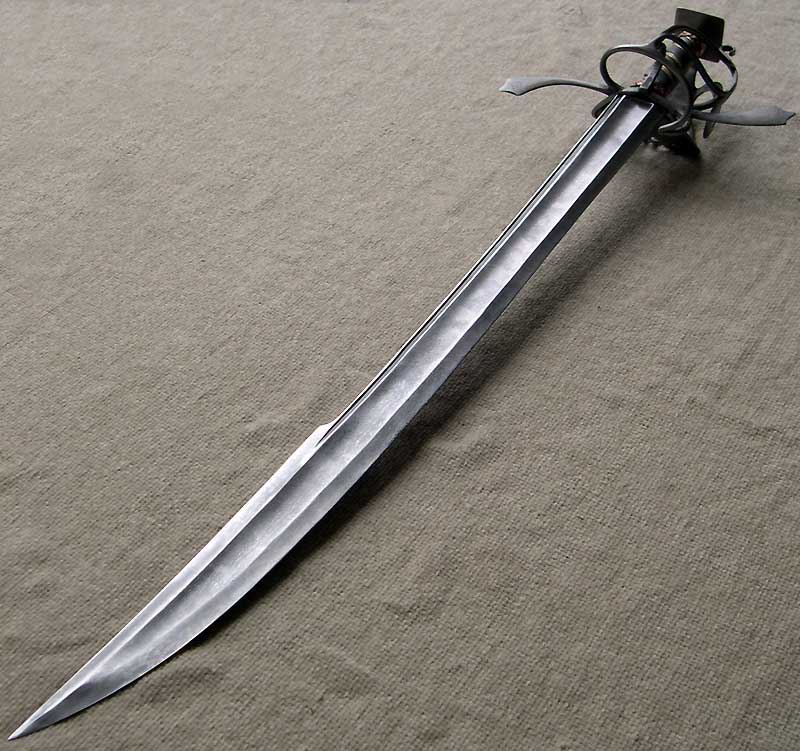
Two swords
Lit in Eden’s flame
One of iron and one of ink
To place within a bloody hand
One of God or one of man
Our souls to one of
Two eternities
|
|
  |
 |
|
Mark Moore
|
 Posted: Mon 30 Dec, 2013 12:52 am Post subject: Posted: Mon 30 Dec, 2013 12:52 am Post subject: |
 |
|
Fantastic work, and a beautiful sword! However, the pics of it unassembled trouble me. The tang-to-blade transition area looks very squared off. In other words...weak. I'd be hesitant to cut any very hard targets with it if it were mine. I'd hate to be left holding that beautiful hilt in my hand without a blade. I could be wrong....maybe , I hope, the tang is sturdier than the photos show. Once again though....beautiful sword!............McM
''Life is like a box of chocolates...'' --- F. Gump
|
|
  |
 |
Matthew G.M. Korenkiewicz

|
 Posted: Mon 30 Dec, 2013 5:20 am Post subject: Posted: Mon 30 Dec, 2013 5:20 am Post subject: |
 |
|
| Quote: | At first I thought that the thumb-ring was positioned too far back. However after
the cutting exercises it seems about right. I knew that the thumb-ring would help maintain
blade alignment during the cut; and that was the case. What I did not count on was how the
thumb-ring kept my hand from slipping down the grip onto the pommel. The forward guard
never made much sense to me until I got the sword in my hand. It is clear that it would do
a good job of redirecting your opponent’s blade around and away from your thumb as it
slid down your blade. |
This is a very entertaining review. Plus you did a great job with providing some
" wallpaper " quality photos.
As something of a student-of-the-thumbring, one can appreciate how it solidifies
the grip and improves the control of the sword. Having only picture evidence and,
alas, a few untranslated books in Polish, I've always wondered if there was a
mathmatically definite position for the thumb-ring to be located.
For instance, let's say the thumb-ring is nearly circular, do you want the center of
that circle, thus the position of your thumb, right on the hilt ? or somewhat below ?
and then how much ?
As you noted, the position of the thumb-ring on your sword prevents your hand
from sliding down into the pommel. So can one assume, if the thumb-ring was
not positioned correctly, the hand slips less-comfortably further down the grip
and affects performance ...
|
|
  |
 |
|
Tim Lison
|
 Posted: Mon 30 Dec, 2013 10:34 am Post subject: Posted: Mon 30 Dec, 2013 10:34 am Post subject: |
 |
|
|
This sword is just great! Terrific choice Kirk. I can't recall seeing a good repro of a sword like this. Vladimir did a wonderful job! Kudos to you both!
|
|
  |
 |
Robin Smith

|
 Posted: Mon 30 Dec, 2013 11:30 am Post subject: Posted: Mon 30 Dec, 2013 11:30 am Post subject: |
 |
|
Agreed with Tim. I really find the complex hilts catching my eye these days. Very nice!
A furore Normannorum libera nos, Domine
|
|
   |
 |
Roger Hooper

|
 Posted: Mon 30 Dec, 2013 11:46 am Post subject: Posted: Mon 30 Dec, 2013 11:46 am Post subject: |
 |
|
|
That is a lovely piece and a great review.
|
|
  |
 |
Nathan Robinson
myArmoury Admin


|
|
    |
 |
|
Patrick Kelly
|
 Posted: Mon 30 Dec, 2013 9:58 pm Post subject: Posted: Mon 30 Dec, 2013 9:58 pm Post subject: |
 |
|
| Nathan Robinson wrote: | | I love this sword. |
It's one of the best replicas of the type I've seen.
"In valor there is hope.".................. Tacitus
|
|
   |
 |
Tom Carr

|
 Posted: Tue 31 Dec, 2013 1:14 am Post subject: Posted: Tue 31 Dec, 2013 1:14 am Post subject: |
 |
|
|
I had the great fortune to be able to handle this sword and I was no less than stunned at the handling qualities and fit and finish. The blade has such an amazing cross section. I think its the finest sword I have ever handled and while I havent had the opportunities some here have had with antiques, I have handled a fair share over the years and no other replica has ever come so close to the Feel of a quality anitque like this one. Nimble.. dangerous....it leaves you with a feeling of power and that you can handle any situation you might face. Thank you Kirk for the chance to get a feel for this lovely and striking work of art..
|
|
   |
 |
|
|

